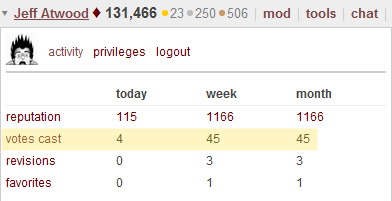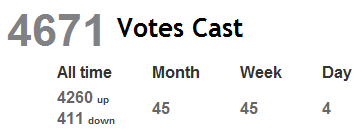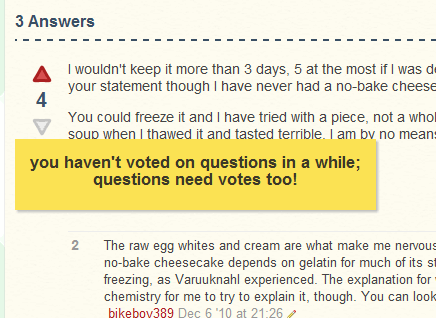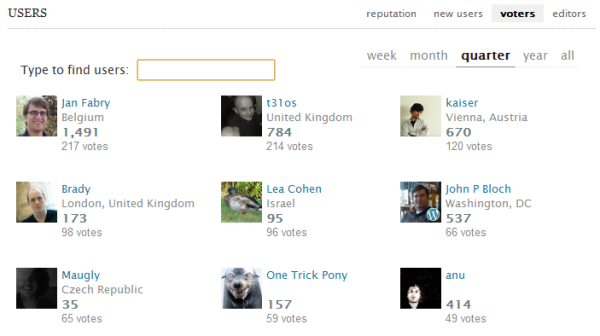When the wordpress.stackexchange.com community asked Why are questions not being voted on …
I have noticed a trend that questions (even good ones) that have multiple answers are not being voted on.
Out of our 5,550 questions only 41% have at least 1 vote which leaves around 3,000 with 0 votes and a few hundred with negative votes.
I had a strong sense of déjà vu all over again.
One of the longest running concerns in Stack Overflow and Stack Exchange history is Why aren't people voting for questions? a question originally posed on Stack Overflow on August 5, 2008 -- long, long before we used UserVoice for this sort of thing. At that point, meta.stackoverflow wasn't even a glint in anyone's eye, much less Area 51 or the Wordpress Stack Exchange.
So, yes, we've known basically forever that questions don't get voted on nearly as much as answers.
Personally, I'm not convinced this problem is necessarily solvable, because it might represent the natural "market value" of questions and answers. Users intuit that answers are the real unit of work in any Q&A; system and tend to favor answers in their voting. After all, the world is awash in endless questions, but answers -- great answers -- are a precious and rare commodity indeed.
There's also a serious workflow problem. Consider what happens when you open a question page:
- Start at the top by reading the question.
- Scroll down. Begin reading answers.
- Consider the relative merit of each answer as you read it, and possibly vote on it.
- Reach the bottom, where the form invites you to provide your own answer.
By the time you get to the bottom, you've probably spent so much time mentally processing the existing answers and deciding whether or not you want to add an answer yourself that you've forgotten the question even exists! That's a shame, because the quality of the answers and the quality of the question are often related. In both positive and negative directions, I mean. If a question is worth answering, isn't it at least worth considering whether you should upvote it? Assuming you can remember to scroll all the way back up to get there, that is.
So how do we encourage people to remember the questions when voting? Perhaps we should institute a new policy: every time you forget to vote a great question up, or a bad question down -- a kitten gets it!

Just kidding. Mostly.
Because we love kittens, we decided to make basic voting statistics a bit more visible for every user. First, in your user drop-down, you can see how many votes you've cast.

Second, on your user page, where we've broken out your voting in a similar public way.

The daily vote limit used to be 30 votes per day; we've increased that to a maximum of 40 votes per day -- but only if you vote on a combination of answers and questions. This isn't as significant as you might think, since it is exceedingly rare for users to even hit the 30 vote daily cap.
Most importantly, we have added a gentle reminder to the voting process itself.

That is, if you haven't voted on at least one question in the last 15 votes you cast -- you'll now get the "you haven't voted on questions in a while; questions need votes too!" reminder every time you vote until you do.
We also added a voters tab to the users page, so you can get an idea which of your fellow community members are truly exercising their democratic right to vote early and often.

I realize we probably won't solve a basic problem we've had since inception of the network overnight. And I still believe that answers are fundamentally more valuable than questions and thus will always naturally garner more votes. But there's no reason we can't put our thumb on the scale to help rebalance things a tad. We've already seen a big increase in question voting with these latest changes, so I am ... cautiously optimistic.
So please do try to keep questions in mind as you're voting. Either up or down.
You know, for the kittens.